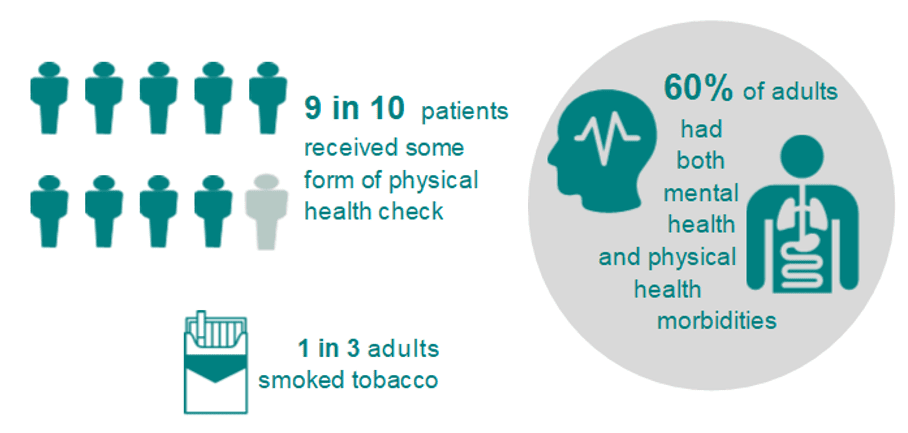Statistics
Considering both physical and mental health
October 24, 2018 by hsca No Comments | Category Health and social care
According to the World Health Organisation, people with severe mental health problems tend to die earlier than the general population. This can be as much as a 10-25 year life expectancy reduction. The majority of these deaths are attributed to chronic physical medical conditions such as cardiovascular, respiratory and infectious diseases, diabetes and hypertension. The Scottish Government’s Mental Health Strategy 2017-2027 recognised the importance of considering the physical health of people with mental health problems, with five action points devoted to the issue.
The Scottish Government’s Chief Statistician released the results from the fourth ‘Mental Health & Learning Disability Inpatient Bed Census’ on the 23rd October 2018. This Census, carried out at midnight on the 28th March 2018, collects information on all patients in a mental health or learning disability bed at that point in time.
Since 2016, the Census has included a suite of Yes/No physical health questions. In 2018, 60% of adult patients had at least one physical health condition, a percentage point increase of seven from the 2016 Census. The most common conditions were hypertension (17% of adult patients), sensory impairment (17% of adult patients), diabetes (12% of adult patients) and chronic pain conditions (12% of adult patients).
The Census also asks for weight and height information for patients which allows Body Mass Index (BMI) to be calculated. Obesity can increase the risk of serious physical health conditions such as heart disease, stroke and type 2 diabetes. Of the adult patients in the 2018 Mental Health Census, 56% were classified as being overweight or obese. This compares to the Scottish Health Survey which reported that 65% of adults were overweight or obese in 2017.
The Mental Health Strategy 2017-2027 highlights the prevalence of smoking in people with mental health problems compared to the general population. Smoking can negatively affect the efficacy of medications taken for mental health problems as well increase the risk of diseases such as lung cancer. The 2018 Mental Health Census reported that 32% of adult patients smoked tobacco in the 12 weeks prior to the Census date. This compares to the 18% of adults reported to have smoked in 2017 according to the Scottish Health Survey. Though the proportion of smokers reported in the 2018 Mental Health Census is three percentage points lower than reported in the 2016 Census, it still remains much higher than that observed in the general population.
In 2015, the Chief Medical Officer set out actions on mental health which included mental health patients receiving physical health checks. The 2017 Mental Health Census added new questions relating to physical health checks and these were retained in the 2018 Census. It was found in the 2018 Census that 92% of adults received a physical health check of some form, which was a percentage point increase of five on 2017.
Moving forward, it will be important to continue to monitor what progress is made in ensuring that physical health is also considered in those patients with mental health problems.
Tags: census, health, Mental Health, statistics


Leave a comment
You must be logged in to post a comment.